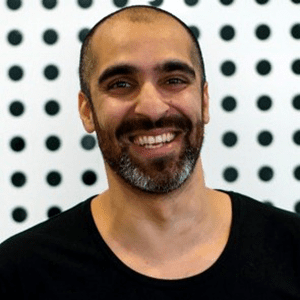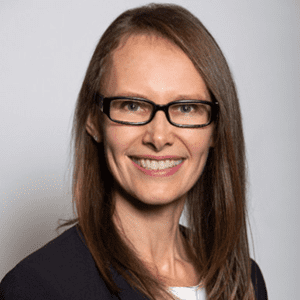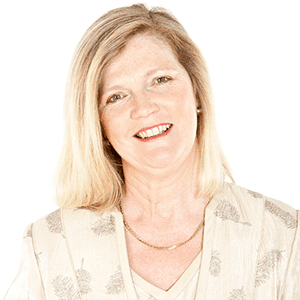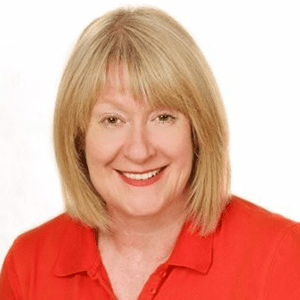

Goal setting – a new perspective
Brad Church likes to ask the question ‘who leads the leader?’. As leaders we need to lead ourselves. That means inspiring ourselves toward our goals and our vision for the future.
As a CEO at Goodman Private Wealth Advisers, Brad has worked with successful families and business people for more than 20 years’ as a trusted advisor.
He has come to recognise that goal setting concepts like ‘work/life balance’ and ‘smart’ goals are actually ineffective for most people. Brad believes that what we’re all really striving for is well-being, a state characterised by health, happiness and prosperity.
Today he shares his step by step repeatable process for goal setting that helps people make progress toward their true state of well-being.
Stephanie: Hello, and welcome to TEC Live. Stephanie Christopher here, chief executive of The Executive Connection. TEC connects CEOs, executives and business owners to the world’s largest business leader network.
Today our guest is Brad Church, a trusted advisor to financially successful people. Brad’s the CEO of Goodman Private Wealth Advisors, a privately owned firm that works closely with a small number of like-minded clients to help them put their entire financial house in perfect order. So Brad’s worked with successful families and successful business people for more than 20 years. He’s seen first hand the benefits that goal setting, when well done, can have on the lives of individuals, families, businesses and communities. Through his business leader workshops, Brad now gives some of his time and expertise to empower people to live their life on purpose. Brad Church, welcome to TEC Live.
Brad: Hi, Stephanie. Good to be here.
Stephanie: Yeah, great to have you here. Okay, so we’re recording this at the end of the year and people are kind of rushing to finish off. I love it, how you do that whole thing of, ‘Oh, my God, next year,’ which is in fact only two weeks away from now. So are goals the same as new year’s resolutions?
Brad: Definitely not.
Stephanie: Oh, okay. Well, there you go.
Brad: So goals when done well have hopefully had some preparation behind them.
Stephanie: Right.
Brad: New year’s resolutions have had a lot of drinking behind them so they’re quite two different things.
Stephanie: Yeah. Right, they are. Okay. Well, that’s good. That’s a beautiful clarification. So I’ve just read it and I’ve just heard you say ‘goals when done well.’ Let’s start with goals done badly. What do bad goals look like?
Brad: Well, bad goals, the outcome of that is very mediocre results, lack of motivation, commitment to actually do the work that’s required to accomplish them. Bad goals probably start with the wrong overarching philosophy.
Stephanie: Yeah, okay.
Brad: And unfortunately, the most popular overarching philosophy that most people work towards is this concept of work-life balance. In my view and in my experience, that is actually contributing to goals done poorly.
Stephanie: Okay. Tell me more about that.
Brad: Let me break it down. So work-life balance kind of implies a couple of things, doesn’t it?
It firstly implies that there are only two things that matter: one’s work, the other is life. So straight up, that life bucket’s an awfully big bucket.
The second thing it implies is that somehow these two concepts, these two buckets deserve equal weighting, and the concept is that you’re constantly trying to bring these two aspects into balance. Now that in the real world is practically impossible. I haven’t met many people who have sustained the equilibrium of work-life balance for any extended period of time. Maybe we’ve had moments and flashes of it being in balance.
The last point I’d make about it is that work-life balance, it limits our thinking about what’s possible.
Stephanie: In what way?
Brad: Well, it’s kind of an end game with work-life balance, isn’t there? It’s trying to tip those scales to an equilibrium and once you’re there, then what do you do?
Stephanie: Yeah. All right, that’s really interesting. And the other thing is you’re usually failing at it, too. So if that’s your end game, there’s this kind of thing of ‘I should be going to the gym more or I should be doing more of something or less of something or less of work or more … ‘ It’s kind of just got kind of a hiding to nowhere sort of thing about it a bit.
Brad: Yeah. And if you’re not succeeding at it, it’s not very motivating, is it?
Stephanie: Yeah, that’s right.
Brad: It’s not very inspiring.
Stephanie: That’s right.
Brad: And if all of your goals are designed to achieve this end game and it’s not working out for you, what do we tend to do as human beings?
Stephanie: Give up.
Brad: Give up, yeah.
Stephanie: Revert to your natural preferences. Well, we’re not going to do that, but-
Brad: Let’s not.
Stephanie: Yeah, let’s not. Okay, so tell me about goals done well, where to start.
Brad: I think the first thing that we ought to do if we’re wanting to do goals well is to shake up our overarching philosophy. My view is that we’re not really striving for work-life balance. What we’re really all striving for is wellbeing. Now when I’m talking about wellbeing, I’m talking about the broader definition. I’m talking about a state characterised by health, happiness, and prosperity. Now, if we can embrace this concept and start to set goals that progress us towards a state of wellbeing, we’re setting ourselves up straight away for a better outcome.
Stephanie: How do you shake up your philosophy? It’s okay to kind of have the semantics of it. It’s not work-life balance. It’s a state of wellbeing. How do you actually shake up your own philosophy?
Brad: Well, it helps first to understand this concept of wellbeing. So let me just explain a little bit more about it.
Stephanie: Yeah, that’s good.
Brad: So there’s actually eight aspects to wellbeing that we ought to be focusing on and that we ought to be setting goals in and making progress in.
Stephanie: Okay.
Brad: The first is physical health. The second, which is quite separate and distinct from physical health, is our inner and emotional health. The third is the environmental aspect. Now, I’m not talking about saving the trees. Here, I’m talking about the environments in which we spend our time, the places we belong.
Stephanie: And does that include the people we hang with?
Brad: It can do. It can include the locations and the geographies that we live in and that we work in. It can be the spaces and the environments that we spend our time in. So places in the home, places in the workplace.
Stephanie: Yeah, right.
Brad: Creating an environment in which we just feel that sense of safety, security and belonging.
The fourth aspect is generosity, so that’s about giving our time or our expertise or our money for the benefit of others. Fifth one is relationships. Sixth one is recreation because it’s okay to have fun. Then, there’s the business and career aspect, and last but not least, the financial aspect. And so, if you embrace this philosophy, then the concept is that we need to be setting goals in and making progress in all eight areas of wellbeing at once. And that can sound a little daunting, can’t it?
Stephanie: Yeah. Look, it sounds daunting, but the other thing that’s coming to mind is as a business owner or a business leader and the year coming ahead, I need to make goals for the year for my business as well as … Am I right that I’m hearing this is kind of more of a whole person goal you’re talking about with wellbeing?
Brad: It is.
Stephanie: So is this something separate?
Brad: No.
Stephanie: Okay.
Brad: It’s very much a part of the business goals that you set because here’s the key thing, rather than trying to achieve this state of equilibrium, which is work-life balance, when you are making progress in one aspect of wellbeing, it positively contributes to the progress that you’re making in all the other areas as well.
Stephanie: Right.
Brad: And you end up with this momentum, this upward spiral. So let me give you a more practical example. In the case of physical health, can you imagine exercising and becoming more physically fit, then turning up to work, being more clearly focused-
Stephanie: Right.
Brad: Having more energy.
Stephanie: Right.
Brad: And being more productive? So the work that you do on your physical health can positively contribute to the goals that you set in your business.
Stephanie: Right.
Brad: And if I flow that on, imagine then the business being more productive, it being more successful. Can you see how that could then spill over into your personal financial aspect? And the financial aspect then spills over into your generosity and so on and so forth.
Stephanie: Right. Right. Did you come up with this model?
Brad: I did originally. It was an interesting moment where I came up with this model because I was just trying to piece together all the things that I’d learnt from working with clients and some of the research and coaching we had done in the US over an extended period of time. And I just had this morning this moment of clarity where I put the model together and my first thought, Stephanie, was ‘I’m a genius.’ And then my second thought was ‘I wonder if it’s true?’
Stephanie: That you’re a genius or the model?
Brad: Well, a bit of both. So then, my commitment was to then go away and do further research on it and back test it. And as it turns out, I’m not really a genius.
Stephanie: Right.
Brad: There’re stacks of literature on what I’m describing here.
Stephanie: Right.
Brad: Some of it is admittedly self-help books, but some of it’s proper quality academic research from places like Harvard. So it’s all out there. I think the one thing I’ve done is I’ve gone looking for it. Whereas really, how often do we spend time to go looking into how we can progress towards a state of wellbeing? We don’t. We’re sort of stuck in our businesses or our careers or our family life.
Stephanie: And how’s this impacted you personally and with your business as well?
Brad: I consider myself very fortunate.
Stephanie: Right.
Brad: So it’s had a significantly positive impact on me and certainly in the way we now go about our business. Our vision for our business is a little unusual in terms of it’s not entirely focused around the financial results. There’s a whole stack of other things that really matter inside of the business, and that is to an extent a byproduct of this personal journey I’ve been on progressing to my own true state of wellbeing.
Stephanie: Yeah, right.
Brad: But look, I’m having a lot of fun. I’m doing well on the business and having the opportunity to give my time and be generous to others, physically fit, happy, healthy. So very fortunate, very grateful.
Stephanie: And then you bought a new puppy and you haven’t-
Brad: Then I bought a new puppy.
Stephanie: And you haven’t slept for weeks. So what’s your background, Brad?
Brad: So, Stephanie, I’ve only ever had one job interview.
Stephanie: Did you get the job?
Brad: I got that job and I’m still there today. So my background started as financial planner. But when you really invest in that and you embrace the concept of what financial planning is about … Because financial planning is really about helping people fund their goals. And so, that’s what’s led me to a far more sort of comprehensive understanding and delivery of the financial house. So our role is to help people put their entire financial house in perfect order so that they can then focus on everything else in life that matters.
Stephanie: Right. So your day job is doing a lot of business work with people. It’s not all esoteric. It’s some financial stuff.
Brad: It’s very hands on and very practical.
Stephanie: Right.
Brad: I mean it’s all well and good to create good goals, to have a great vision, to be clear about your values. But success is ultimately in the implementation, isn’t it?
Stephanie: Yeah, it is.
Brad: So in order to help our clients and give them the highest probability for achieving their goals, they need to have a team of experts actually implementing it all for them, and that’s where we step in. So we’ll help them create the big picture plan. But then I’ll have a team behind me that ensures it’s executed really well.
Stephanie: I love it. So that kind of is the mix of the whole, well, it’s the whole person and their whole business as well.
Brad: That’s right.
Stephanie: Yeah, it’s great. Just I’m interested to hear that there’s both sides, but your background’s so interesting. So you’ve started in one place and kind of really expanded from there.
Brad: Yeah, I have. I’ve learned a lot. I mean I consider myself very fortunate because when you’re working with people who have enjoyed a lot of success in life, you can’t help but learn from that and you’re learning the good and the bad. Just because you’ve been financially successful, doesn’t mean you’ve got every aspect under control.
Stephanie: Of course.
Brad: So it’s been a valuable … As much as I’ve been advising my clients, I’ve been learning a lot as well.
Stephanie: Yeah, great. That’s great. Back to you talked about the importance of preparation.
Brad: Yes.
Stephanie: So tell me more about how can you prepare. Because it is quite daunting. A list of eight of anything is daunting. So how do you prepare to shake up your own philosophy about work-life balance and about setting goals?
Brad: Yeah.
Stephanie: How do you you prepare for this?
Brad: A good friend of mine has this quote that I like to restate and he says, ‘The success of what we’re currently doing is built upon the foundation that immediately precedes it.’ So I think this is really relevant to this point about preparation for goals. So if once you’ve embraced the concept of wellbeing, then there’s a couple of steps that you then need to take before you dive in and start setting goals.
The first step is to go through a process of values discovery. So values being our beliefs about what’s important to us. The second step is then to create our vision for our life. And I don’t mean any ordinary vision. I mean a vision for our ideal life. And then only after you’ve completed those two steps, are you really prepared to go through the exercise of setting goals?
Stephanie: And the goals, what’s the timeframe for the goals?
Brad: Whatever your timeframe is in the context of your ideal life vision.
Stephanie: Right.
Brad: So the goals, I actually use the word goals and milestones interchangeably because really, goals are creating something that we’re working towards in our future that’s probably better than where we are now. And they can be near term goals. They can be far goals, but the idea is that you’re making progress, and it’s actually okay to break them down into smaller milestones.
Stephanie: And then I guess you’ve got the idea of success when you reach a milestone and you tick it off.
Brad: Yeah, you do, and that’s one of the, just from a goal setting technique or skill point of view, giving yourself permission to set a gimme, so to speak, an easy goal, an easy win. If-
Stephanie: Yeah, yeah, yeah. Like your to-do list when the first thing you put there, you’ve already done. Yeah.
Brad: Yeah, yeah. If I go back to those eight areas of wellbeing, there are some aspects that we’re strong in naturally. There are others that we aren’t. So one way I might try and make progress towards an area that is not a strength of mine is to set a relatively easy near term goal that I know even when I set it, it’s highly likely to be achieved because when I get there, I can celebrate that. But also, I recognise that I’m now closer to the end goal that I’m really aiming for and I can set the next goal and move on with a little bit more positivity and confidence. So we’ve got to help ourselves to achieve that success.
Stephanie: Yes. So give me an example of a near term goal.
Brad: Let’s talk about one that’s pretty simple to visualise. Let’s talk about physical health. So at this time of year, especially after we’ve been through Christmas and New Year, so often we set the goal to lose some weight. And maybe the amount of weight we want to lose in the end, maybe it’s a large amount, maybe it’s a bit daunting. So rather than go out there and say, ‘I want to lose 10 kilos,’ a nearer term goal and a simpler goal might be to say, ‘I want to lose 2 kilos by the end of March.’ Much closer, relatively easy to achieve, giving yourself enough time to get there, maybe the 10-kilo goal’s by Christmas, but a nearer term one might be a smaller number in a shorter amount of time. When you get there, that gives you the motivation and the inspiration to keep moving on.
Stephanie: So it’s almost like tricking yourself into succeeding, isn’t it?
Brad: In a sense. I prefer to say we’re leading ourself.
Stephanie: Yeah, okay. Nice.
Brad: Especially when, if we’re business leaders or many of us are leaders in life even at home with their family and our kids, sometimes, there’s a need to be kind to those people that we’re leading. Same’s true for ourselves. When we’re trying to lead ourselves, it is okay sometimes to be kind to ourselves.
Stephanie: Business leaders are really hard on themselves, aren’t they?
Brad: Mm-hmm (affirmative).
Stephanie: And often give the least amount of time to themselves.
Brad: They do, yeah.
Stephanie: So if you’re worrying about your business, able to take some time off over Christmas, but then you really think about, oh, whatever’s happening, headwinds, economy, all of that, how hard is it for a business leader to take the time to really focus on themselves and eight things that seem pretty self-focused?
Brad: It is hard. This time of year is a fabulous time of year to do it because often in business, we’re already taking some time out. One of the people that I worked with in the US, he made the comment that whenever … he comes to Australia over Christmas, New Year, the whole country’s shut. So our customers often don’t expect us to be here during that time. So we carve out the time, but we need to believe that those other areas of wellbeing are going to help us in our business.
Stephanie: That’s the important thing, isn’t it?
Brad: It really is.
Stephanie: So just make that link even more powerful. I got you, I got the kind of image that if you’re fitter or getting more sleep or whatever, then you’re going to be more productive. But help me make that link even more about prosperity from doing all the other bits.
Brad: It’s really about the whole person. I think you used that word at the very beginning. If we’re improving ourselves and our whole person, we’re going to be better people inside the business, aren’t we? If we’ve got better relationships outside of the business, we’re not going to be thinking about that in the business.
Stephanie: Yeah, right.
Brad: We’re probably also going to have better relationships with the people in the business. If we’re being generous to others in the community, we’re probably going to be more generous to others inside of the business, but we’re also going to carry a sense of fulfillment into the business that just shows up. If we’re enjoying more financial success away from the business, we’re going to feel less pressure inside of the business to do things that are purely driven by money.
There’s no doubt in my mind and there’s no doubt from the evidence that I have seen, spending time and making progress in those other areas help us be better people when we turn up to work.
Stephanie: Have you got any examples of any business leaders you’ve worked with through this process?
Brad: I do. I have the good fortune of being able to work with a lot of successful people and successful business owners. I’ve got a couple of fabulous examples. I’ll use this one. This one’s a bit unique. Sometimes when we’re looking at the eight areas of wellbeing, the generosity aspect is one that sometimes people struggle with because they’re saying, ‘Well, surely if I’m giving time away or if I’m giving money away, then I have less of that.’ In my experience, it’s not true.
So one thing that I have seen one business owner do was he made the decision to empower a million people out of poverty, and this personal vision actually became very much part of the business vision. So all of a sudden, the business had a vision of not just empowering a million people out of poverty, but 1.5 million.
Stephanie: Right.
Brad: Because the staff bought into it. Now the next thing that happened is because the staff bought into it this, this business became a great place to work.
Stephanie: Yeah. It had a purpose.
Brad: It had a purpose and now all of a sudden when they were recruiting, they always had the idea of recruiting top people, great people, but when you’re in the marketplace, sometimes you win those people and sometimes you don’t, but this vision started causing them to win most of the A grade quality people through their recruitment efforts and all of a sudden, the business started having an incredible team of people and it grew and it was successful and it was prosperous. Fabulous way of how a personal aspect around generosity had a significantly positive impact on an entire business.
Stephanie: I’m going to get you to just go through the list of eight again.
Brad: Sure.
Stephanie: So tell us the eight again.
Brad: First is physical health. Then, there is the inner and emotional health. I’ll just touch on that one. Just a key aspect there is about personal growth and development and also being spiritual, whatever that means to you. The third one is the environmental aspect. Fourth one, generosity. Fifth one is relationships. Then, there is recreation, the business and career aspect, and then last but not least, the financial aspect.
Stephanie: That’s a solid list of eight. I think just even in understanding and reviewing that list, it lets someone kind of map out where they’re going. Think about the preparation so changing your mindset from one kind of paradigm of work-life balance into perhaps something broader. But the way the list is of eight, it breaks it down enough so it’s easy enough for you to perhaps focus on what I’m going to do. And the other thing I like that I heard from you is small achievable goals so you’re kind of getting into the groove of it, you get some momentum and then, you have success.
Brad: Yes.
Stephanie: Brad, wonderful. Thank you so much for sharing that with us.
Brad: Pleasure.
Stephanie: And well done. You are a genius indeed. And thanks for joining us on TEC Live.
Brad: My pleasure. Thank you, Stephanie.
Stephanie: So that’s TEC Live for today. CEOs are in the business of making decisions and leadership is the art of execution. I’m Stephanie Christopher and look forward to talking to you next time.



